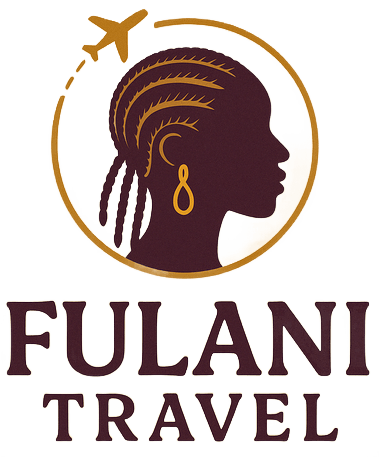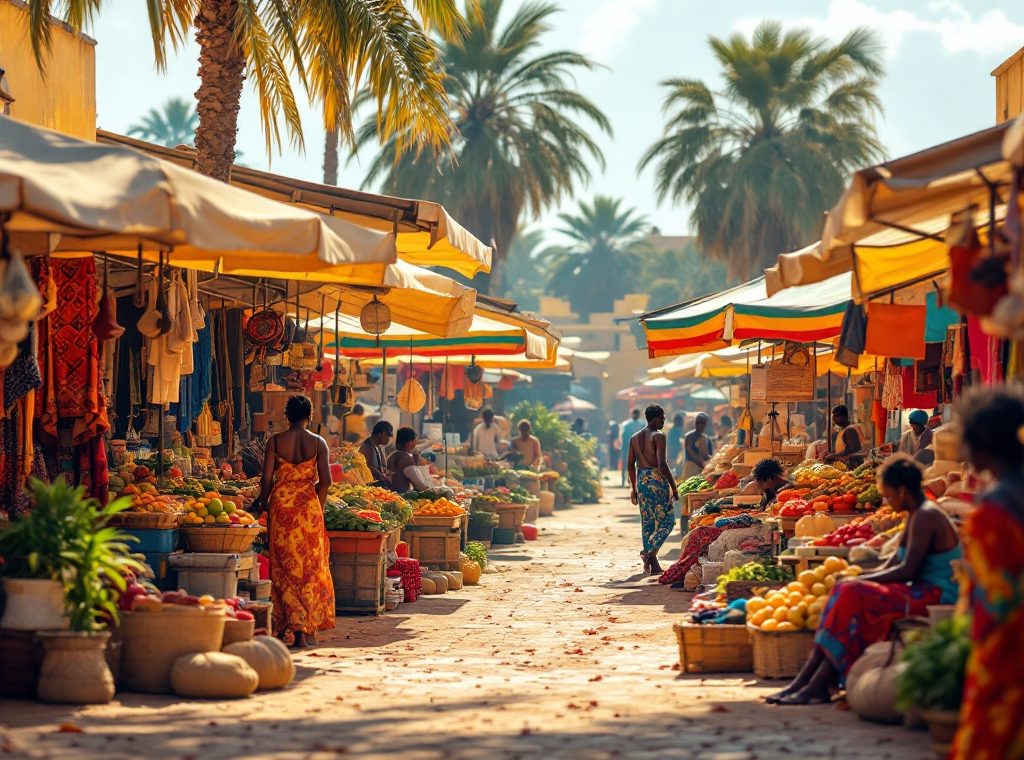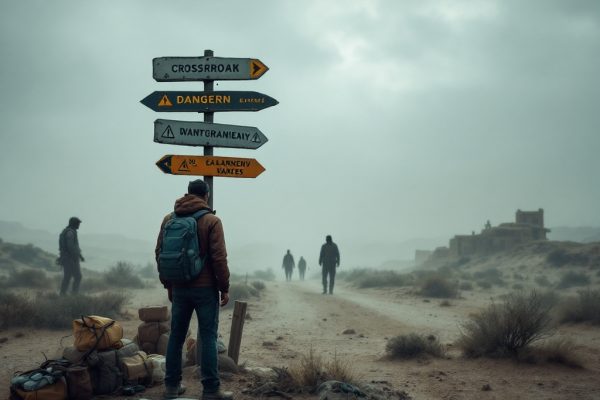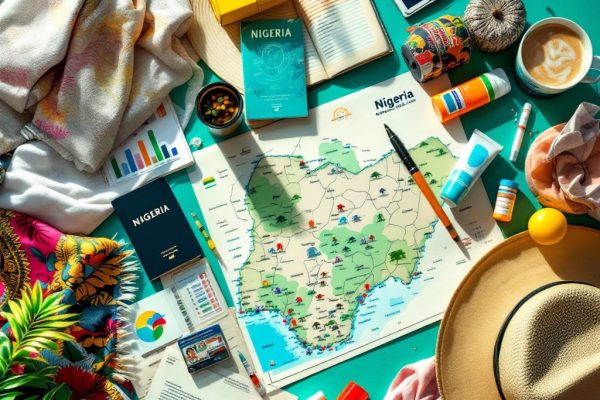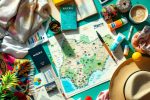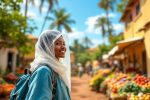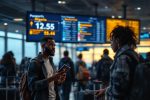Is Senegal Safe to Travel: A 2025 Safety Guide for International Tourists
Planning a trip to Senegal in 2025? While Senegal offers rich culture and stunning landscapes, safety concerns require careful planning. Civil unrest, crime, and potential disruptions to essential services necessitate vigilance. This comprehensive guide provides crucial safety information, including regional risks, health precautions, transportation advice, and emergency contacts, empowering you to navigate potential challenges and experience a safe and rewarding journey. Discover how to prepare for a secure trip to Senegal.
Important information
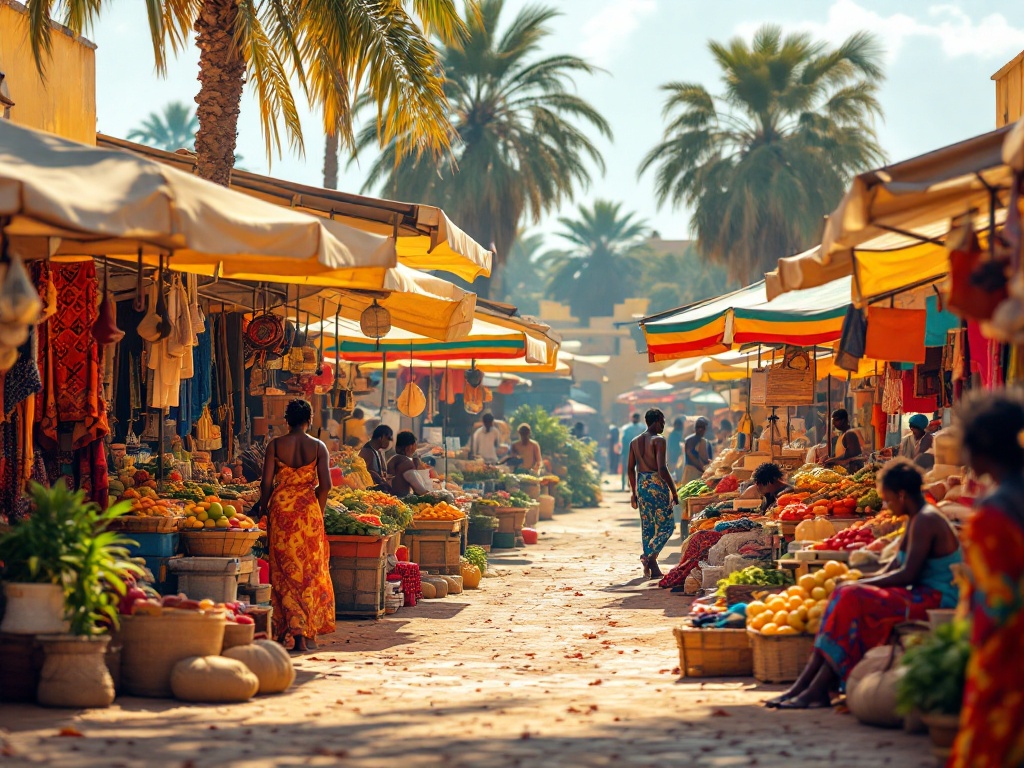
- Civil unrest and crime are significant risks in Senegal, especially in the Casamance region. Avoid large gatherings and protests, and stay informed about local news.
- Medical resources are limited. Obtain necessary vaccinations for malaria, typhoid, and yellow fever, and consider medical evacuation insurance. Drink bottled water and practice good hygiene.
- Transportation can be challenging. Avoid public transport and driving at night. Use registered taxis or hire a driver. Road conditions can be poor, especially during the rainy season (June-October).
- Consular assistance may be limited. Be self-reliant and have emergency plans. Carry ID and share your itinerary with someone at home.
- Senegal criminalizes homosexuality, posing legal risks for LGBTQIA+ travelers. Women travelers should exercise vigilance due to the possibility of harassment.
Is Senegal Safe to Travel in 2025?
Traveling to Senegal in 2025 requires careful planning due to safety concerns. Civil unrest and crime pose significant risks. Protests have escalated into violence, resulting in injuries and fatalities. Avoid large gatherings and stay informed about local news. Essential services, including transportation and communication, may be disrupted. Consular assistance might be limited, so self-reliance is key.
Safety Concerns in Senegal
Civil unrest and crime present significant risks. Protests have turned violent, leading to injuries and fatalities. Avoid large gatherings and stay updated on local news. Essential services like transportation and communication may be disrupted.
Specific Regional Risks
The Casamance region has heightened dangers, including landmines and criminal activity. Terrorism is a potential threat, especially in remote areas. Consular assistance may be limited, so self-reliance is crucial.
Step 1: Monitor Local News
Stay informed about current events and potential safety risks by regularly checking local news sources.
Step 2: Avoid Large Gatherings
Steer clear of protests, demonstrations, and other large gatherings to minimize the risk of encountering violence or unrest.
Step 3: Be Prepared for Disruptions
Essential services like transportation and communication could be disrupted. Have backup plans in place and ensure you have essential supplies.
Step 4: Exercise Caution in Casamance
The Casamance region poses heightened risks due to landmines and criminal activity. Reconsider travel to this area if possible.
Step 5: Be Aware of Terrorism Threat
Terrorism is a potential threat in Senegal, particularly in remote areas. Exercise increased caution and vigilance.
Step 6: Rely on Yourself
Consular assistance might be limited. Be prepared to rely on yourself for support and resources in case of emergencies.
Travel Safety Overview for International Tourists
When traveling in Senegal, exercise normal precautions and stay informed about potential security updates by checking the U.S. Department of State’s reports. Petty theft is common, particularly in crowded areas, so maintain awareness of your surroundings. Opt for registered taxis, as public transport poses greater safety risks. It’s also advisable to avoid traveling after dark and plan your activities during daylight hours. Here’s a summary of safety tips for Senegal:
- Check U.S. Department of State reports for security updates.
- Be aware of your surroundings in crowded areas to avoid petty theft.
- Use registered taxis instead of public transport for safer travel.
- Avoid traveling after dark and plan activities during daylight hours.
Understanding the Current Risk Level in Senegal
Traveling to Senegal requires vigilance, especially in higher-risk areas. For instance, the Casamance region faces ongoing civil unrest and banditry, demanding extra caution. Other areas may be safer, but staying informed about potential hazards remains crucial. Check travel advisories before and during your trip, and always be mindful of your surroundings.
Areas to Avoid: High-Risk Zones
Safety risks, including armed robberies and landmines, exist in the Casamance region. Stick to main roads and well-traveled areas.
Avoid solo ventures. Prioritize your safety.
Protests can occur and escalate rapidly. Steer clear of all demonstrations.
Personal Security Measures for Tourists
Carry your ID, as required by local law.
It’s best to avoid walking alone at night, particularly for women.
Dress in a way that doesn’t draw unwanted attention.
Keep your belongings close and secure.
Use only reputable taxi services and avoid unlicensed cabs.
Be cautious with cash handling to prevent currency scams.
Stay informed about local crime trends and steer clear of isolated areas, especially after dark.
Protect your personal information and don’t share it with strangers.
Secure your valuables to prevent theft.
Show respect for local customs and dress codes.
Safety Tips for Traveling in Senegal
Be aware of your surroundings, especially in crowded areas or at night. Avoid displaying expensive items such as jewelry or electronics, and keep your valuables secure and hidden.
Choose safe transportation options, like registered taxis, and avoid walking alone in isolated areas, particularly after dark.
Large gatherings can be unpredictable, so stay informed about potential safety risks by monitoring local news and avoiding protests or demonstrations. Check travel advisories and heed warnings from local authorities or your embassy.
Before you travel, plan for potential emergencies. Compile essential contact information, including your embassy, local emergency services, and family members. Make copies of important documents such as your passport and insurance information, and store them separately from the originals.
Familiarize yourself with evacuation routes and the locations of nearby medical facilities.
Maintaining Personal Security and Awareness
Stay alert to your surroundings, especially in busy areas or popular tourist spots. Avoid flashing expensive jewelry or electronics and secure your valuables in your hotel safe. Exercise caution at ATMs, opting for machines located inside banks whenever possible. If you sense any danger, remove yourself from the situation.
Avoiding Protests and Public Gatherings
Large gatherings and protests can present safety risks. Prioritize your well-being and avoid them if possible. If attendance is unavoidable, inform someone of your plans and maintain awareness of your surroundings.
Monitoring Local Media for Safety Updates
Stay informed during your travels to prioritize safety. Check local news for up-to-the-minute information. Excellent resources include newspapers, radio, and television broadcasts. Supplement these with official sources, such as government websites and social media travel advisories. These resources are key for safe travels, but verifying information from multiple sources offers a more comprehensive understanding. For instance, compare news reports with official announcements. Have a safe and informed trip.
How to Prepare a Contingency Plan for Emergencies
Identify emergency contacts. Locate the local police, fire department, ambulance services, nearby hospitals, and English-speaking doctors.
Share your itinerary. Inform someone back home about your travel plans, including your itinerary and planned activities, and establish a way to contact them.
Copy important documents. Photocopy your passport and visa and store these copies separately from the originals.
Research potential emergencies. Familiarize yourself with emergencies specific to Senegal.
Health and Safety Precautions in Senegal
Planning a trip to Senegal? Prioritize your health and safety by understanding potential risks. Consult your doctor about necessary vaccinations and medications for diseases like malaria, typhoid, and yellow fever. Ensure your polio vaccination is up-to-date.
Preventing Illness in Senegal
Preventing illness is crucial for a safe and enjoyable trip. Follow these important guidelines:
- Drink only bottled or purified water, and avoid tap water entirely.
- Dine at reputable establishments, opting for well-cooked meals.
- Use mosquito nets and insect repellent to protect yourself from malaria and other mosquito-borne illnesses.
Medical Care and Insurance
Medical care in Senegal can be limited, so take these precautions:
- Research hospitals and clinics in your destination city in advance.
- Identify where to seek care in an emergency.
- Travel insurance, including medical evacuation coverage, is strongly recommended. This safeguards you against unexpected medical expenses, evacuations, and trip disruptions. Confirm your policy covers Senegal-specific medical needs.
Key Health Risks and Vaccinations
Traveling to Senegal requires awareness of potential health risks, particularly malaria, typhoid, and yellow fever. Protect yourself by getting recommended vaccinations.
Recommended Vaccinations
- Measles, mumps, and rubella (MMR),
- Hepatitis A,
- Hepatitis B.
Crucial Vaccinations
- Typhoid,
- Yellow fever.
For personalized advice tailored to your specific needs, consult your doctor or a travel health specialist. This will ensure you receive the most appropriate recommendations for a safe and healthy trip.
Preventing Illness: Disease Prevention Strategies
Protect yourself from malaria by consistently taking prescribed medication.
Minimize mosquito bites by using insect repellent and wearing long sleeves and pants. Sleeping under a mosquito net provides additional protection.
Maintain good hygiene by frequently washing your hands with soap and water or using hand sanitizer.
Be cautious about water safety; avoid tap water and ice made from it.
Medical Care and Emergency Services
Medical resources in Senegal are scarce, especially outside urban centers. Consult a physician promptly if you experience any health issues after your trip. Having local emergency contacts readily available is essential for a safe and secure journey.
The Importance of Travel Insurance
Planning a trip to Senegal? Consider securing medical evacuation insurance. This type of insurance covers emergency transportation to a better-equipped medical facility, either within Senegal or back to your home country. Accessing quality medical care can be challenging in Senegal, so having medical evacuation insurance ensures you receive the necessary treatment, wherever it’s available. It’s a vital safety net for any traveler.
Transportation and Road Safety in Senegal
Traveling in Senegal requires careful planning, especially regarding transportation. Driving can be challenging as local drivers often disregard traffic laws, and public transportation isn’t recommended for tourists. Instead, opt for regulated taxis, but remain vigilant even in these. Road conditions can change drastically, particularly during the rainy season. Always carry your driving documents and avoid driving at night due to poor lighting and many unlit vehicles.
Safe Transportation Options in Senegal
For safety, tourists should utilize reliable transport services, such as:
- Regulated taxis from your hotel.
- Hiring a local driver.
- Renting a car (prioritize safety).
Important Safety Advice
- Avoid overcrowded buses and vans.
- Always wear your seatbelt.
- Refrain from driving at night, especially outside urban areas.
- Exercise caution when walking near traffic.
- Familiarize yourself with local traffic rules.
Road Conditions: While major roads are generally well-maintained, minor roads can be quite rough. Local driving habits may not adhere to international standards, increasing the risk of accidents.
Driving at Night: Avoid driving at night due to poor lighting and many unlit vehicles. This significantly increases the risk of accidents.
Driving Documents: Always carry your driving documents with you. This is essential in case of any incidents or checks by authorities.
Understanding Transportation Safety Protocols
Getting around requires a bit of planning. You can choose from taxis, buses, or rental cars. Licensed taxis are safer than unofficial rides, and it’s always wise to agree on the fare beforehand to avoid any disputes. If available, ride-hailing apps are another convenient option. For greater flexibility, consider renting a car. Before you drive off, however, inspect the car’s condition and verify the insurance coverage. Since road conditions can be unpredictable, exercise additional caution, especially at night. Here’s a breakdown of your transportation options:
Taxis
- Licensed taxis offer more security.
- Agree on the fare before starting your trip.
Rental Cars
- Provides greater flexibility.
- Inspect the car and insurance before driving.
- Exercise extra caution due to unpredictable road conditions.
Ride-hailing apps are a convenient alternative if available.
Road Safety Tips for Tourists
Prioritize your safety by opting for registered taxis or reputable transportation services.
Avoid packed public transport whenever possible.
Always buckle your seatbelt for security.
Refrain from driving at night.
Limited visibility and unforeseen hazards increase risks.
Exercise extreme caution near traffic, particularly while walking.
Familiarize yourself with local traffic regulations to ensure a safe and informed experience.
Understanding Local Laws and Customs in Senegal
Entry Requirements and Visa Information
For your trip to Senegal, ensure your passport is valid for at least six months after your return date. Visas are required for most nationalities and should be obtained from a Senegalese embassy or consulate before travel. Some nationalities can receive a visa upon arrival at Blaise Diagne International Airport (DSS). Confirm the specific visa requirements based on your citizenship.
Respectful Practices and Local Laws
Senegal’s predominantly Muslim population observes modest dress customs. Respectful attire is recommended, especially when visiting religious sites; covering your shoulders and knees is generally advisable. Public displays of affection are uncommon. During Ramadan, be mindful of local customs regarding eating and drinking in public. Same-sex relations are prohibited by Senegalese law, and regulations against certain behaviors are strictly enforced. Always keep your identification with you.
Entry and Exit Requirements for International Tourists
Traveling to Senegal? Ensure your passport is valid beyond your departure date. Many nationalities, including those from the US, Canada, and the EU, can enter visa-free for short stays, but always confirm the specific requirements for your country. Check with your airline or a travel agent about potential departure taxes.
Cultural Sensitivity and Dress Code
In Senegal, the predominantly Muslim culture emphasizes modest attire, especially outside tourist zones. Women typically opt for loose clothing that covers their shoulders and knees. Observing these customs demonstrates respect for local traditions.
Men frequently choose long pants and shirts. When visiting religious sites such as mosques, respectful dress is essential; this generally involves covering your head and removing your shoes.
LGBTQIA+ and Female Travelers: Additional Safety Considerations
Senegal’s laws criminalize homosexuality, posing potential legal risks and discrimination for LGBTQIA+ travelers. Extreme caution is highly recommended.
Female travelers should also be aware of the possibility of harassment and exercise additional vigilance.
Specific Safety Tips for Female Travelers
Prioritize your safety by staying aware of your surroundings, especially at night and in secluded locations. Avoid walking alone in deserted areas after dark. Instead, opt for safe transportation like registered taxis.
Dress respectfully and observe local customs to minimize unwanted attention. If you experience harassment, seek immediate assistance from local authorities or your embassy/consulate.
Carry a personal safety alarm and be prepared to use it. Stick to well-lit and populated areas.
Inform someone of your itinerary, including your destination and expected return time.
LGBTQIA+ Safety: What to Know Before Traveling
Senegal criminalizes homosexuality, posing legal risks for LGBTQIA+ travelers. They may face hostility, discrimination, and unsupportive local norms. Carefully consider these risks before traveling.
Consular Assistance and Emergency Contacts
Traveling in Senegal? Be prepared for emergencies. Contact your embassy or consulate for assistance with lost passports, medical emergencies, and legal issues. Keep their contact information readily available.For immediate help, these numbers are crucial:
- police (17),
- fire department (18),
- medical assistance (15).
Remember, your embassy’s contact details vary based on your nationality. Maintain a list of personal contacts. Family and friends are invaluable resources during a crisis.
How to Access Consular Assistance in Senegal
Compile a list of emergency contacts, including your nearest embassy or consulate.
Familiarize yourself with local emergency numbers and locate nearby hospitals.
A local mobile phone will prove invaluable.
Consider having a medical evacuation plan.
Important Emergency Contacts for Tourists
In case of emergency:
- police: 17,
- fire services: 18,
- medical assistance (SAMU): 15.
Embassy contact information:
- American Embassy: +(221) 33 879 4000,
- British Embassy: +(221) 33 823 73 00,
- Canadian Embassy: +(221) 33 889 47 00,
- French Embassy: +(221) 33 839 51 00,
- German Embassy: +(221) 33 889 37 00.
Natural Disasters and Seasonal Considerations
Senegal experiences two distinct seasons impacting travel. The rainy season, from June to October, brings heightened risks. Flooding is common in coastal areas and near the Senegal River, while landslides can occur throughout the country. The dry season, conversely, increases the risk of drought and bushfires, impacting agriculture and water resources. Earthquakes are rare. For safety information, including weather forecasts and disaster warnings, consult the National Agency for Civil Aviation and Meteorology (ANACIM).
Rainy Season (June – October)
- increased risk of flooding, particularly in coastal regions and areas near the Senegal River,
- landslides are a concern.
Dry Season
- droughts severely impact agriculture and water resources,
- increased likelihood of bushfires.
Earthquakes are infrequent.
For safety information, including weather forecasts and disaster warnings, consult the National Agency for Civil Aviation and Meteorology (ANACIM).
Risks Associated with the Rainy Season
Heavy rainfall significantly increases the risk of flooding, especially in urban areas and low-lying regions. This excess water creates breeding grounds for mosquitoes, leading to a heightened risk of malaria. Road travel becomes dangerous due to flooding and poor road conditions. Contaminated water sources can also spread waterborne diseases such as cholera and typhoid. Exercise extreme caution during periods of heavy rain.
Risks of Heavy Rainfall
- Increased flooding in urban and low-lying areas.
- Higher risk of malaria due to mosquito breeding in stagnant water.
- Dangerous road conditions due to flooding and deterioration.
- Spread of waterborne illnesses like cholera and typhoid from contaminated water.
Safety Precautions
Exercise extreme caution during periods of heavy rain. Avoid unnecessary travel. If you must travel, check road conditions and be aware of potential hazards. Ensure access to clean drinking water and practice good hygiene to prevent waterborne diseases.
Understanding the Impact of Natural Disasters
Senegal’s weather poses diverse challenges. Frequent droughts contrast sharply with flooding during the June to October rainy season. Coastal erosion is exacerbated by rising sea levels and powerful storms. While earthquakes and volcanoes are rare, the northern region frequently experiences dust and sandstorms.
